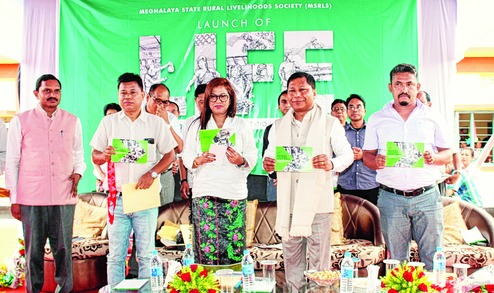
Songsak, July 11: Meghalaya chief minister Mukul Sangma today launched the Livelihood Intervention and Facilitation of Entrepreneurship (Life) programme in Songsak in the East Garo Hills.
Songsak is about 210km west of the state capital, Shillong.
Speaking at the launch of the programme, Mukul said, Life is the "most inclusive" of all the programmes of the state government, "unlike the central schemes, which are mostly meant for the people below poverty line".
The chief minister was accompanied by elementary education and literacy minister Deborah Marak and a host of other dignitaries, including parliamentary secretaries Cherak Momin, Brigady Marak and Sengman Marak.
Mukul said the government, with its convergence of thoughts and actions, has been making an effort to reach out to the people with different sustainable and livelihood programmes to empower and enable the people for economic prosperity.
"I have been designing the programme to include everybody in the state of Meghalaya, so that each one of us can benefit from the schemes," he said.
He urged the people to form self-help groups (SHG) in their area and under Life, different activities would be started to ensure people are able to generate income and eradicate poverty.
"We will ensure that people can generate income in their own backward by providing them assistance to do plantation and other income-generating activities through different livelihood missions of the state."
He said the main idea of Life was to ensure people migrate from urban areas to rural areas, as against the current trend, for taking up activities that revolves around agriculture, horticulture and other allied sectors.
He said there are rich natural resources in Garo hills and people should take advantage of the resources and judiciously use# it for their prosperity.
Mukul said a few years back, the road network in Songsak area was very bad. But ever since the road connecting Shillong to other parts of Meghalaya and neighbouring Assam has been improved, people should take advantage of the good road network to engage in business and other entrepreneurial activities.
"To bridge the economic disparity and ensure progress, Life will be implemented across the state, so that there is inclusive development," Mukul said while informing the people about a slew of initiatives taken up by the government to meet their aspirations.
Life is a programme of the Meghalaya State Rural Livelihood Society (MSRLS), an agency of the community and rural development department, government of Meghalaya. Commissioner and secretary of community and rural development department, Sampath Kumar, termed the launching of Life as an important milestone in taking forward the self-help group movement in Meghalaya.
Kumar said the government envisages to reduce poverty by building capacity and linking the SHGs to different financial institutions. "Life will give support to every block in the state and supplement the efforts of National Rural Livelihoods Mission (NRLM) and encourage NGOs and village employment councils (VECs) to further organise women into SHGs."
He said Meghalaya has over 4 lakh active job-card holders and if one female member is encouraged to be part of the SHG, there will be a total of 40,000 SHGs. "We have a clear goal and vision to promote SHG movement in the state, particularly in rural areas. Self-help group is the only effective way to reduce largescale poverty and enhance livelihood and security for the people," Kumar said.
Informing that Life will focus on capacity building, Kumar said under the programme, every 10 SHGs will be motivated to act like a bank and help each other. "Last year under MGNREGA, Megahalaya received Rs 500 crore and if 10 per cent of wages are saved, then around 50 crore can be saved each year," Kumar said, while informing the people that the government would encourage formation of thrift societies for credit flow to farmers and women members.
He told the people that the government has envisaged a strong network of SHGs in Meghalaya to promote development activities at the grassroots level.
Highlighting that the government has been making efforts to reach out to the people to ensure accelerated growth, Deborah Marak said, "The people of Garo hills must partner with the project and reap its benefits."
Marak also urged the people to make the legislators accountable so that there is transparency in the state. "There is lack of development in different parts of Meghalaya. Different schemes were launched to reach out to the people but many have failed, as beneficiaries have been left out," Marak added, while urging the people to understand the programme of the government and receive its benefits.
Life aims to bring all the poor and vulnerable women into the SHG movement by emphasising on reviving the inactive and the functional ones and include them within the Life programme.
The programme will be implemented in line with the NRLM# in the remaining non-NRLM blocks with an objective to support the community through the SHGs formation.
It will also motivate and encourage every woman from every household under NREGA job cardholders and form SHGs. The VEC functionaries are being used to assists the NGO in social mobilisation and prepare them for the transition into NRLM and strengthen the existing SHGs.
NRLM also promotes livelihood through women SHGs and their Federations. The programme thrusts on improving the livelihood of rural poor in a sustainable manner through SHGs, village organisations and producers groups.
The NRLM is being currently implemented in 21 blocks of Meghalaya.
So far, a total of 1,472 people in different blocks of the state have benefited from the scheme. In 2017-18, the programme aims to reach out to additional 2,144 villages.










